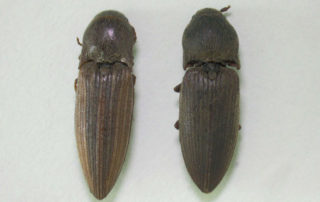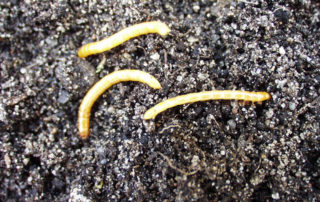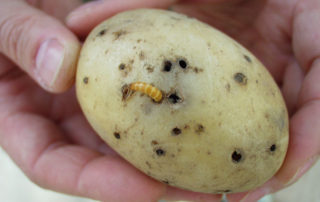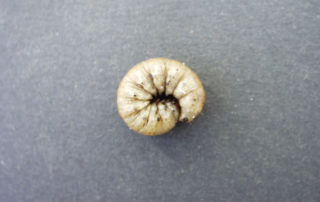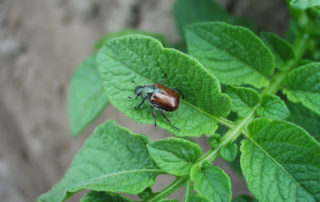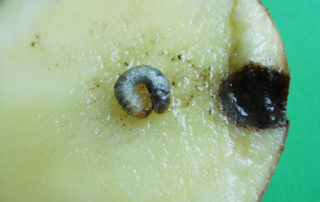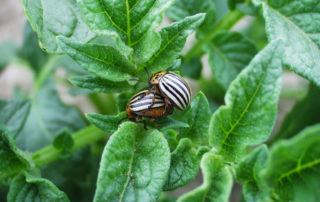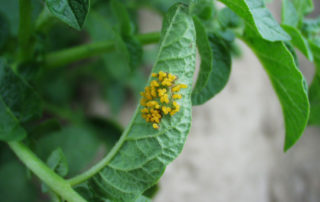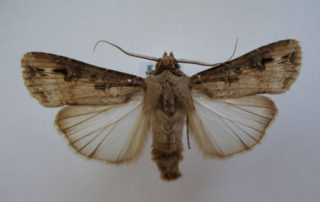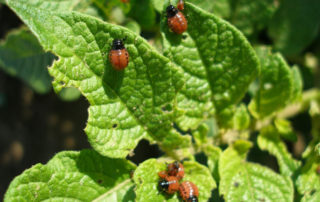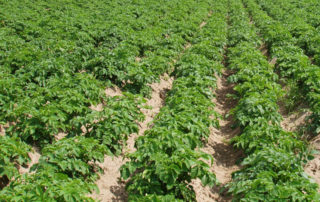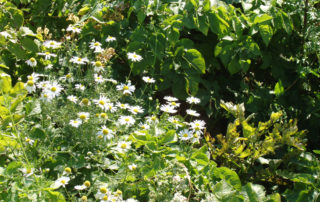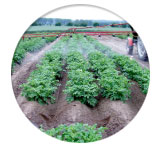
Potato Protection Laboratory
Phytopathology
- Long-term monitoring of changes in populations of pathogens causing fungal and bacterial diseases, related to climate warming and genetic changes, as well as new sources of infection in potato crops in Poland and Europe.
- Diagnostics of potato plant health problems and yield to minimize losses.
- Research on the causative agents of diseases and their role in the epidemiology of potato diseases. Studies on species composition of pathogen populations (e.g., fungi of the genus Alternaria), role in infection, characterization of new genotypes of Phytophthora infestans, pathogenicity, and virulence characterization.
- Characterization of resistance to fungal and bacterial diseases in new potato lines and varieties, conducted under field, storage, and laboratory conditions.
- Evaluation of the suitability of fertilizers and other similar substances (e.g., soil conditioners, growth regulators) in improving the health of potato plantations and the size and quality of yield.
- Collection of basic potato pathogens on artificial media to ensure quick access to plant material.
Herbology
- Comprehensive protection of potatoes against weed infestation. Work focuses on the correct selection of doses and application times of herbicides, as well as the diagnosis of undesirable phenomena associated with their use, such as phytotoxic reactions of specific varieties to herbicide active ingredients.
- Evaluating the possibility of using growth regulators or other substances to shorten the duration of these symptoms on plants, significantly reducing the risk of yield reduction.
- Studying the species composition of weeds, which is important in the context of climate warming (species previously unseen in our region or occurring at low intensities).
Plant Protection
- Dynamics and monitoring of harmful insects from the Elateridae family, Scarabaeidae, and the subfamily Noctuinae in potato crops.
- Impact of insecticides from various chemical groups and alternative natural (plant-based) compounds on reducing Colorado potato beetle feeding in potato cultivation.
- Research on the effectiveness of plant protection products (fungicides, insecticides, aphicides, herbicides, seed dressings, growth regulators, and others) intended for potato plantation protection, including for registration procedure purposes (certification).
- Optimization of plant protection product application (selection of doses and timing) and positioning of plant protection products in protection programs (using their properties depending on the development stage of the crop and pests) in demonstration experiments.
- Diagnosis of undesirable phenomena such as phytotoxic reactions of specific varieties to active substances.
- Evaluation of the suitability of fertilizers and other similar substances (e.g., soil conditioners, growth regulators) in improving the health of potato plantations and the size and quality of yield.
- Application of solutions to minimize the use of plant protection products in integrated protection (use and validation of decision support systems in potato plantation protection).
Ongoing Projects
- Research for phytopharmaceutical companies for the registration procedure of plant protection products in Poland. Research includes the effectiveness of plant protection products in potato plantation protection, phytotoxic reactions of tested varieties, and impact on yield (size and structure of yield, starch content, dry matter content, and possibly sensory characteristics).
- International cooperation in potato research (pathogens, pests, and potato protection) within the framework of EAPR (European Association for Potato Research) and scientific networks (Euroblight).
- Validation of decision support systems in potato protection in agricultural practice (agreements with farmers).
Training
- Organizing training using the principles of Integrated Plant Protection.
Laboratory Head
Dr. inż. Janusz Urbanowicz – Head of the Laboratory
- Phone: +48 94 342 30 31 ext. 253
- Email: j.urbanowicz@ihar.edu.pl
Scientific Staff
Dr. inż. Janusz Urbanowicz – Assistant Professor
- Phone: +48 94 342 30 31 ext. 253
- Email: urbanowicz@ziemniak-bonin.pl
Dr. inż. Jerzy Osowski – Assistant Professor
- Phone: +48 94 342 30 31 ext. 222
- Email: j.osowski@ihar.edu.pl
Research and Technical Personnel
Mgr inż. Hanna Gawińska-Urbanowicz – Engineer
- Phone: +48 94 342 30 31 ext. 214
- Email: h.gawinska-urbanowicz@ihar.edu.pl
5PO6BO7110/95
Analysis of the occurrence and harmfulness of stem blight - a new form of potato blight Financing institution: Scientific Research Committee (KBN) Implementation period: (1996-1998) Name and role of employees: Józefa Kapsa, project manager Jerzy [...]
2 P06R 045 30 Grant Promotorski
Title: Species composition, harmfulness and eradication of wireworms (Coleoptera; Elateridae) in potato cultivation Financing institution: Scientific Research Committee (KBN) Implementation period: 5.04. 2006 - 4 April 2007 Name and role of employees: prof. dr hab. [...]
N N310 144735 Grant promotorski
Project title: Sensitivity of selected potato varieties to metribuzin depending on the level and duration of its distribution in plant leaves Number: N N310 144735 Financing institution: Ministry of Science and Higher Education Implementation period: [...]
Polish-Danish project
Project title: Development and Implementation of an Internet based Decision Support System for Integrated Pest Management in Poland, 2001-2002. Sub-Component: Late Blight. Financing institution: EU Implementation period: (2001-2002) Name and role of employees: Józef Kaps, [...]
Polish-American grant
Project title: Collaborative research with Russian scientists to enhance potato late blight resistance mediated by Poland's Plant Breeding and Acclimatization Institute. Part two. Data collection of epidemiology of Late Blight in Poland Number: 61-grant-3-4-00-0-00 Financing [...]
CICSA
Project title: Crop Improvement Center for Sustainable Agriculture - WP2 Workshops and Seminars (5th Framework Program for Research and Technological Development and Demonstration Activities) Implementation period: (2003-2006) Lead performer: Józef Kapsa
ENDURE
Project title: European network for the sustainable use of crop protection strategies. Subtasks: RA1. Optimization and reduction of pesticide use. Potato crate. IA2.4. Development of a modeling platform and integration of decision support systems Financing [...]
- Testing of Plant Protection Products
- Evaluation of fungicides, herbicides, insecticides, growth regulators, and seed treatments for registration purposes (GIORiN Certificate) or for assessing their suitability in protection programs.
- Diagnostics of Potato Plant Health Problems
- Diagnosing health issues in potato plants and yield to minimize losses, including expert court opinions.
- Professional Training in Integrated Plant Protection
- Providing professional training on Integrated Plant Protection for plant protection services, professional clients, breeders, seed companies, production associations, and individual farmers (GIORiN Certificate).
- Development of Potato Protection Programs
- Creating protection programs for potatoes intended for various uses, adhering to the standards of integrated plant protection. Customizing protection programs for individual farms and entities.
- Preparation of Biological Material for Research and Educational Purposes
- Preparing biological material for other institutions for research and educational purposes, including diagnostics, isolation, and collection of pests.
Our lab

Diagnostics Laboratory
Molecular and Biochemistry

Seed Laboratory
potato

Resource Laboratory
Genes and Cultures in Vitro

Lab
Potato protection

